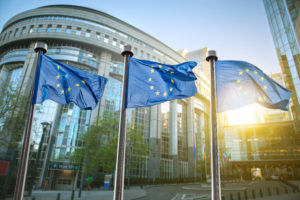Highlights from Recent Weeks
CW 8 / Monday, 21 to Thursday, 24 Feb.: Green Week (no meetings);
DATA ACT – EU COMMISSION PRESENTS PROPOSAL: Last week, the EU Commission presented its proposal for the Data Act. This is part of the EU data strategy and pursues the goal of leveraging the value creation potential of non-personal data and making it accessible to a larger number of stakeholders. This will involve regulating the rights and obligations of data holders vis-à-vis users with regard to access to data and establishing rules for data sharing and service interoperability. The focus of the Data Act is on data generated by connected products, such as smart speakers or fitness trackers.
DIGITAL MARKETS ACT I – COMPROMISE PROPOSAL FROM THE COMMISSION: In its compromise proposal (PDF), released ahead of the technical meeting on 18 Feb., the executive branch incorporates several ideas from the Parliament and Council into the DMA’s commitments.
Among other things, obligations are included that require gatekeepers both to make the default settings easily changeable and to change the selection of default programs at the initial startup. This should also apply to virtual assistants and browsers. The proposal also includes a ban on circumvention measures in the form of so-called “dark patterns” in Articles 6a and 11.
The Executive also proposes replacing the complaint mechanism proposed by the Parliament (Article 24a) with an information mechanism on undesirable practices of a gatekeeper addressed either to the relevant national competition authority (NCA) or to a competent authority and the Commission.
The high-level expert group of national regulators requested by Parliament has been included in this version but contains minor changes: The European networks of regulators are represented, i.e. the networks for telecommunications (BEREC), data protection (EDPB and EDPS), competition (ECN), consumer protection (CPCN) and audiovisual (ERGA).
DIGITAL MARKETS ACT II – EXPERT REPORT WARNS OF LOOPHOLES: A new legal opinion from Germany warns of weaknesses in the planned Digital Markets Act (DMA). The planned regulation, as currently discussed, offers several loopholes that would allow large digital companies to circumvent the rules, according to the report (PDF), which was commissioned by Lobby Control. In addition, the authors believe that the EU Commission is not broadly enough positioned for the threatened proceedings.
The rapporteur for the DMA in the EU Parliament, Andreas Schwab, is also calling for more resources on the part of the Commission. He urges in a joint letter (PDF) with MEP Eva Kaili to the French Presidency that 220 new posts be created in the Commission to ensure effective enforcement. The estimates in the Commission’s proposal only plan for 80 additional employees.
TRADE AND TECHNOLOGY COUNCIL – NEXT MEETING IN MARCH: On 15-16 May, the USA and EU are scheduled to meet in France for the next round of Trade and Technology Council (TTC) talks. It would be the second meeting of the TTC after the one in Pittsburgh on 29 Sept. 2022 (see Commissioner Dombrovskis on Twitter).
ALLIANCE FOR THE FUTURE OF THE INTERNET – NEW COUNCIL MANDATE: The French EU presidency has sent out an updated version of the mandate to Member States that would allow the Commission to negotiate a partnership of sorts with the U.S., covering issues from data to cyberspace. The updated vision states that “these principles are not legally binding, but should serve as a reference for policymakers as well as citizens, businesses and civil society organisations.” (see Politico Pro, EN, paywall)
OECD – UPDATE ON GLOBAL MINIMUM TAX: Pascal Saint-Amans is responsible at the Organisation for Economic Cooperation (OECD) for reaching global agreement on new (digital) tax rules. Last week, he gave a presentation (PDF) on the status of his work, which is expected to result in updated standards by 2024.
Accordingly, at least as far as the non-political aspects of the tax reforms are concerned, things are progressing rapidly. Several public consultations – both on how the world’s 100 largest companies will allocate their revenues between the countries in which they operate and on how a global minimum tax rate of 15 per cent will be implemented – are expected in late 2022.
But the most important political issues still need to be resolved. It is considered unlikely that the U.S. Senate will pass the necessary international agreement that would allow American companies to pay higher taxes abroad. Meanwhile, some EU member states are hesitating on the global minimum tax agreement. (see Politico, EN)
DIGITAL EUROPE PROGRAM – EUR 292 MILLION FOR FURTHER PROJECTS: The EU Commission has opened the second series of calls for proposals for the Digital Europe program.
The calls are addressed to companies, organisations and public administrations from EU Member States, EFTA/EEA countries and entities from other countries associated with the program.
The deadline for these calls is17 May 2022. More information on how to apply for grants under these calls is available online.
ARTIFICIAL INTELLIGENCE I – PARLIAMENT BEHIND PLAN: Euractiv (EN) reports from parliamentary circles that the most important part of the work will take place during the amendment process. The dual leadership approach means that the two rapporteurs must first agree on common ground. But even agreeing on a less ambitious design seems challenging, given how many issues are proving contentious, from compliance self-assessment to enforcement architecture. A common denominator could be found for some requirements and prohibitions. MEPs are also considering extending the ban on social scoring by private entities, similar to the Council compromise text. The ambitious schedule has already been delayed by several weeks.
ARTIFICIAL INTELLIGENCE II – FURTHER COUNCIL REQUIREMENTS FOR HIGH-RISK AI: According to a compromise proposal (PDF) submitted by the French Council Presidency to the Telecom Working Group on 22 Feb., the group wants to expand the conformity assessment requirements for high-risk AI systems.
The proposal contains a list of criteria that are to be binding for the standards institutes as guidelines for their evaluation processes. High-risk AI systems would be deemed compliant with the regulation if the criteria are met.
In doing so, the Commission, which issues mandates to the European standards organisations in accordance with Article 10 of the AI Regulation, should ensure two main criteria: That AI systems respect European values and that they strengthen the EU’s digital sovereignty. Further objectives are to be the promotion of investment and innovation as well as the competitiveness and growth of the single market.
Finally, the Council Presidency wants the Commission to consult the planned AI Committee in advance if it intends on extending existing harmonised standards with implementing acts. In this way, the French Council Presidency wants to ensure greater participation by the Member States. (see Table Europe, paywall and Contexte, FR, paywall)
TELECOM INFRASTRUCTURE – TECH COMPANIES TO FINANCE EXPANSION: According to a recent report by Politico Pro (EN, paywall), the EU Commission plans to heed the call of telecom companies and involve tech companies in funding infrastructure expansion.
In the second compromise text on digital targets for 2030, the French EU presidency had indicated that tech companies could be asked to share the burden of 5G coverage of all populated areas over the next eight years.
“Convergent conditions for investments in digital infrastructures will be needed in order to create a framework where big platforms make a fair and proportionate contribution for the cost of digital infrastructure,” quotes Politico Pro from the preamble of the compromise to the decision, which outlines ways for the Commission and EU countries to pursue and implement goals for the EU’s digital transformation.
E-ID TOOLBOX – COMMISSION LAUNCHES CONSULTATION PLATFORM: To ensure that the European digital identity quickly becomes a reality, the Commission has asked member states to develop a toolbox that addresses the technical aspects of the future system, taking full account of the parallel legislative debates in Parliament and Council and adapting to their outcome. This shared toolbox is expected to be available in September 2022. The online platform now established is to remain open for comments throughout the legislative negotiations and the work on the toolbox (see press release COM).
GERMANY – HABECK PRESENTS COMPETITION PRIORITIES: German Economy and Climate Minister Robert Habeck was in Bonn last week for his inaugural visit to the German Federal Cartel Office (tweet). On this occasion, he also published his ministry’s ten priorities for the competitiveness policy agenda until 2025 (see Politico Pro, EN, paywall).
Individual publications, including from the EP Think Tank:
- Results of the General Affairs Council, 22 Feb.;
- Results of the Competitiveness Council, 24 Feb.;
- EU Funding for Broadband 2021-2027 (information)
Outlook for the current week
A list of upcoming dates of the European Parliament can be accessed here. You can find the preliminary meeting calendar for 2022 here (PDF).
On Tuesday, a special session on the Ukraine crisis will be held in plenary. The Committee on Legal Affairs will host Commissioner D. Reynders for a debate next week. There, as well as in the Committee on the Internal Market, the topic of eID is also on the agenda. The Committee on the Internal Market also reports on the status of the DSA negotiations and the Committee on Industry on the status of NIS2.
An overview of the most important dates of the Council week can be found here or the calendar of meetings here, the focal points of the meetings of the next 14 days here and the provisional calendar of meetings of the French Council Presidency here (PDF, EN).
Among them are:
Summit and Ministerial Meeting:
- Informal Ministerial Meeting on Cohesion Policy, Monday, 28 Feb. and Tuesday, 1 March;
- The Justice and Home Affairs Council (including E-Evidence, Incitement and Hate Crime), Thursday, 3 Mar. and Friday, 4 March – agenda, A-items, A-items Addendum 1;
- Informal meeting of the General Affairs Council, Thursday, 3 March and Friday, 4 March;
- Informal Meeting of Development Ministers, Sunday, 6 March and Monday, 7 March;
Preparatory bodies:
- Working Party on Competition, Monday, 21 February and Thursday, 3 March;
- Audiovisual Working Party, Monday, 28 February;
- Committee on Cultural Affairs, Monday, 28 February;
- Working Party on Tax Questions (High Level), Monday, 28 February;
- Working Party on Telecommunications and Information Society (including Data Act), Tuesday, 1 March;
- Horizontal Working Party on Cyber Issues (including NIS2), Tuesday, 1 March;
- Working Party on Competitiveness and Growth – Internal Market (including DSA), Tuesday, 1 March, and Friday, 4 March;
- Working Party on Competitiveness and Growth (Industry), Thursday, 3 March;
- Coreper I, Wednesday, 2 March and Friday, 4 March;
- Coreper II, Monday, 28 February and Wednesday, 2 March;
Information on the weekly Commission meeting can be found in the preview (PDF) or (at short notice) in the current agenda. Highlights are the Legislative Proposal Against Child Abuse (last postponed to 30 March) or the Media Freedom Act (29 June).
For the coming week, the following items are on the agenda:
- Joint European action for more affordable, secure and sustainable energy
- 2023 Fiscal policy guidance
- A future-proof European Growth Model: towards a green, digital and resilient economy
The E(U)CJ court calendar can be found here.
Committees in the European Parliament
CW 9 / Monday, 28 Feb. to Thursday, 3 March: Group and Committee Meeting Week (Brussels);
LIBE Committee (EP)
Current Meetings
- Monday, 28 Feb. 2022, 19:00-20:00 (Brussels)
- Friday, 4 March 2022, 9:00-10:45 (Brussels)
Extract from the provisional agenda
A discussion with Commissioner Johansson on the current situation in Ukraine is scheduled for Monday. The agenda was not yet available at the time of writing.
Other sessions (calendar)
- Wednesday, 16 March 2022, 9:00-12:00 and 13:45-15:45 (Brussels)
- Thursday, 17 March 2022, 9:00-12:00 and 13:45-15:45 (Brussels)
JURI Committee (EP)
Current Meetings
- Monday, 28 Feb. 2022, 13:45-16:00 and 16:45-18:45 (Brussels)
Extract from the provisional agenda
28 February 2022, 13.45 – 14.15
…
- Exchange of views with Didier Reynders, Commissioner for Justice
28 February 2022, 14.15 – 16.00
- Exchange of views with Éric Dupond-Moretti, Minister of Justice, and Olivia Grégoire, Secretary of State for Social Economy, on the priorities of French Presidency
28 February 2022, 16.45 – 17.45
…
- Amending Regulation (EU) No 910/2014 as regards establishing a framework for a European Digital Identity
JURI/9/06239
***I 2021/0136(COD) COM(2021)0281 – C9-0200/2021
| Rapporteur for the opinion: | |||
| Pascal Arimont (PPE) | |||
| Responsible: | |||
| ITRE* | Romana Jerković (S&D) | ||
- Exchange of views
…
Other sessions
- Monday, 14 March 2022 (Brussels)
Schedule of dossiers (17 Feb. 2022)
ITRE Committee (EP)
Current Meetings
- Thursday, 3 March 2022, 9:00-12:00 (Brussels)
Extract from the provisional agenda
3 March 2022, 9.00 – 12.00
…
- Measures for a high common level of cybersecurity across the Union, repealing Directive (EU) 2016/1148
ITRE/9/04961
| Rapporteur: | ||
| Bart Groothuis (Renew) | ||
- Reporting back to committee on the negotiations (Rule 74(3))
…
Other sessions (calendar)
- Monday, 14 March 2022, 14:45-16:15 (with CONT, ITRE, REGI; Brussels)
Schedule of dossiers (15 Feb. 2022)
IMCO Committee (EP)
Current Meetings
- Monday, 28 Feb. 2022, 13:45-16:15 and 16:45-18:45 (Brussels)
Extract from the provisional agenda
28 February 2022, 13.45 – 16.15
…
- Single Market For Digital Services (Digital Services Act) and amending Directive 2000/31/EC
IMCO/9/04992
***I 2020/0361(COD) COM(2020)0825 – C9-0418/2020
| Rapporteur: | |||
| Christel Schaldemose (S&D) | |||
| Responsible: | |||
| IMCO* | |||
- Reporting back to committee on the negotiations (Rule 74(3))
…
- Amending Regulation (EU) No 910/2014 as regards establishing a framework for a European Digital Identity
IMCO/9/06237
***I 2021/0136(COD) COM(2021)0281 – C9-0200/2021
| Rapporteur for the opinion: | |||
| Andrus Ansip (Renew) | PA – PE704.865v01-00 | ||
| Responsible: | |||
| ITRE* | Romana Jerković (S&D) | ||
- Consideration of draft opinion
- Deadline for tabling amendments:16 March 2022, 12.00
…
Other sessions (calendar)
- Wednesday, 16 March 2022, 13:45-15:15 (Brussels)
Schedule of dossiers (Feb. 2022)
CULT Committee (EP)
Current Meetings
- none
Other sessions (calendar)
- Monday, 14 March 2022, 13:45-15:45 and 16:45-18:45 (Brussels)
- Tuesday, 15 March 2022, 13:45-15:45 and 16:45-18:45 (Brussels)
AIDA Committee (EP) – Special Committee on Artificial Intelligence in the Digital Age
Current Meetings
- none
Other sessions (calendar)
- Tuesday, 22 March 2022, 9:00-12:00 (Brussels)
INGE (EP) – Special Committee on Foreign Influence on all Democratic Processes in the European Union, including Disinformation
Current Meetings
- none
Other sessions (calendar)
- Monday, 14 March 2022, 16:45-18:45 (Brussels)
- Monday, 28 March 2022, 16:45-18:45 (Brussels)
Further Scheduled Parliamentary Calendar Dates
CW 10 / Monday, 7 March to Thursday, 10 March: Plenary Sessions Week (Strasbourg);
Week 11 / Monday, 14 March to Thursday, 17 March: Committee Meetings Week (Brussels);
Week 12 / Monday, 21 March to Thursday, 24 March: Mini Plenary Sessions Week (Brussels);




